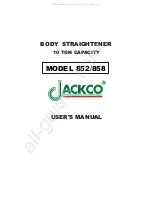
ALMAG-01
Operating manual Page 13
Spinal column consists of 33-34 vertebras, which constitute cervical, thorocic, lumber,
sacral and coccygeal parts of spinal cord. Between vertebras are soppy cartilaginous
tissue, so called disks, which serve as shock-absorbing padding. Next to each disk there is
nervous root from spinal cord to that or another human body. Of the state of spinal cord
nerves depends the normal functioning of all human organs and systems. If disk is in
good condition (sound), it allows the vertebral segments to move easily, without nerve
incarceration. With disks feeding disorder they are worn out, inter-disk pressure increases.
With the time the near vertebras become so close to each other that touch and irritate
nervous root when move. In the course of time there may appear the formation of
intervertebral hernia.
The mostly affected parts of spinal cord are lumbar and cervical parts, rarely – thorocic
part.
Symptoms:
The patients with lumbar affected part suffer from lumber region pain at
physical tension, quick inconvenient movement, long tension state or getting cool. The
patient also may feel pain in such organs as bowels, sex organs.
If cervical parts is affected not only nerve roots and their arteries are subjects to
pressure, but the spinal cord and inter-vertebral arteries. This is revealed itself with neck,
shoulder and back of the head pain, which may be spread to arm, shoulder blade and the
front area of chest.
Osteochondrosis of thorocic part of spinal cord is revealed itself with spinal column
pain, pain syndrome from the side of human internal organs (heart, stomach, lung, liver,
kidneys, urinary bladder, pancreas) and disorder of their function (dyskinesia).
Very often osteochondrosis is complicated with neurological complication as a result
of nerve ending pressing.
At first the patient is prescribed with short-time bed rest within 2-3 days. With pain
syndrome subside it is necessary to strengthen back muscle corset with the help of
physical exercises.
Magneto-therapy with the help of ALMAG device is recommended to be carried out
beginning with the first days of disease diagnosing.
Curative effect.
To make anti-inflammatory, anti-edema, anesthetizing action. Beside
we have: the improvement of nerve endings conduction being pressed between vertebras
resulting in recovery of the function of organs to which these nerve endings close come;
Traveling pulsating magnetic field promotes the improvement of blood flow to the
diseased area, increases metabolic activity in adjoin tissues leading both to disk tissue
gradual recovery and normalization of its function.














































